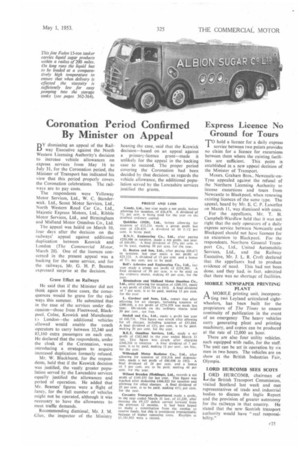Coronation Period Confirmed By Minister on Appeal
Page 71

If you've noticed an error in this article please click here to report it so we can fix it.
BI/ dismissing an appeal of the Railway Executive against the North Western Licensing Authority's decision to increase vehicle allowances on express services from May 16 to July 31, for the Coronation period, the Minister of Transport has indicated his view that this period properly covers the Coronation celebrations. The railways are to pay costs.
The respondents were Yellowav Motor Services, Ltd., W. C. Standerwick. Ltd., Scout Motor Services, Ltd., North Western Road Car Co., Ltd., Majestic Express Motors, Ltd., Ribble Motor Services, Ltd., and Birmingham and Midland Motor Omnibus Co., Ltd.
The appeal was heai'd on March 10, four days after the decision on the railways' appeal against additional duplication between Keswick and 1.ondon (The Commercial Motor, March 20). One of the licences concerned in the present appeal was a hacking for the same service, and for the railways, Mr. G. H. P. Beames expressed surprise at the decision.
Grave Effect on Railways He said that if the Minister did not think again on these cases, the consequences would be grave for the railways this summer. He submitted that in the case of the services under discussion—those from Fleetwood, Blackpool, Colne, Keswick and Manchester t.) London—the additional vehicles allowed would enable the coach operators to carry between 32,340 and 83,160 extra passengers on each one. He declared that the respondents, under the cloak of the Coronation, were introducing a stratagem to acquire increased duplication formerly refused.
Mr. W. Blackhurst, for the respondents, held that if the Keswick decision was justified, the vastly greater population served by the Lancashire services equally justified the allowances and period of operation. He added that Mr. Beames' figures were a flight of fancy, for the full number of vehicles might not be operated, although it Was necessary to have the allowances to meet traffic demands.
Recommending dismissal, Mr. J. M. Glen, the inspector of the Ministry hearing the case, said that the Keswick decision—based on an appeal against a primary-licence grant—made it unlikely for the appeal in the backing case to succeed. The proper period covering the Coronation had been decided by that decision; as regards the vehicle allowance, the additional population served by the Lancashire services justified the grants.








































































































































































































































